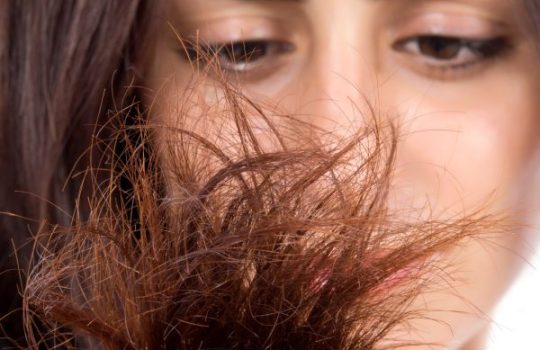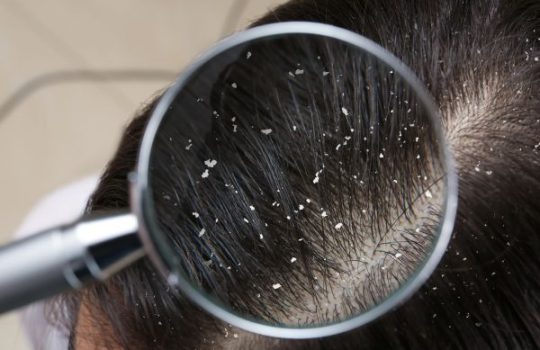Hair dandruff: the guests that no one wants to have
May 31, 2024 2024-05-31 11:45Hair dandruff: the guests that no one wants to have
Hair dandruff: the guests that no one wants to have
Dandruff is a small hair problem that affects more than 50% of adults in France. Yes, you read that right, more than half of us! These little flakes of skin can become a real nuisance, but don't worry, we're here to help. In this article, we explain to you what hair dandruff is, why we have it, and above all... How to get rid of it!
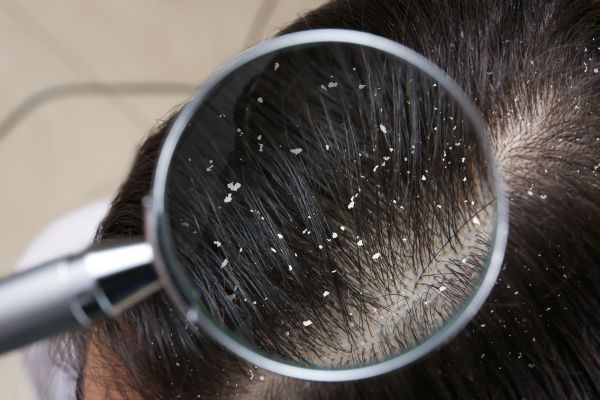
What is dandruff?
Dandruff is small, fine particles, often visible as white or yellowish flakes, that flake off the scalp. But what exactly makes them up? In fact, they are made up of dead skin cells. Our scalp, like the rest of our skin, is constantly regenerating, this process of cell renewal means that new skin cells are constantly being produced, while old ones die and shed.
There are two main types of hair dandruff: dry and oily. Dry dandruff is usually small, white and comes off easily. They look like fine flour. On the other hand, oily dandruff is larger, yellow in color and tends to adhere to the scalp and hair, giving the latter an oily appearance.
Why do we get dandruff?
Hair dandruff is caused by several factors. Here are some of the most common:
Unbalanced Scalp Microbiome: Our scalp is home to a community of microorganisms, including bacteria and yeast. An imbalance in this microbiome, in particular an proliferation of certain yeasts such as Malassezia, can lead to excessive flaking and therefore dandruff.
Dry or oily skin: People with particularly dry or oily skin are more likely to get dandruff. Dry skin can cause thin, white hair dandruff, while oily skin can cause thicker, yellowish hair dandruff.
Reactions to hair products: Some hair products can irritate the scalp and cause dandruff. This can include harsh shampoos, conditioners, styling products, etc.
Skin Conditions: Certain skin conditions, such as psoriasis, seborrheic dermatitis, or eczema, can also cause dandruff.
Environmental Factors: Environmental conditions, such as cold, dry weather, can dry out the scalp and cause dandruff. Likewise, not washing your hair often enough can allow oil and dead skin cells to build up, which also causes hair dandruff.
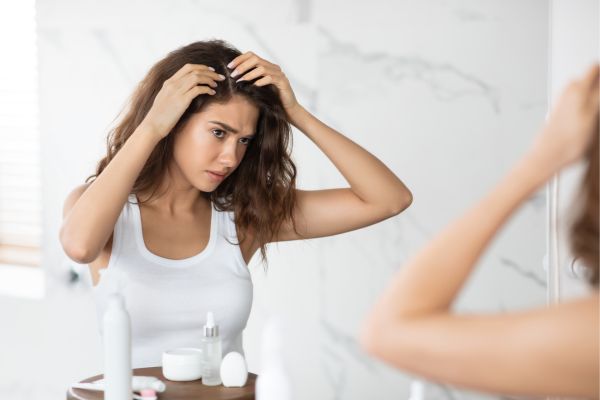
How to treat hair dandruff?
If you're prone to dandruff, don't worry, you're not alone. Fortunately, there are many solutions to effectively deal with this problem.
Starting with shampoo or anti-dandruff treatment is a great first step. These treatments are specially designed with ingredients that target the common causes of hair dandruff. Like our purifying detox mask , developed from thyme, pepper extracts, salicylic acid or even clay. The latter helps control the proliferation of yeast on the scalp, regulates excess sebum and slows the appearance of dandruff.
For more severe cases of hair dandruff, your dermatologist may recommend prescription topical treatments. This could include creams, lotions, or foams containing ingredients like ketoconazole, an antifungal, or corticosteroids, which can help reduce inflammation and irritation. Don't forget about home remedies, which can also be helpful in treating hair dandruff. Tea tree oil, for example, has antifungal properties and can be added to your regular shampoo. Apple cider vinegar can help balance the pH of your scalp, thereby reducing yeast growth.
In addition to these treatments, it is important to maintain good hair hygiene. Washing your hair regularly can help remove excess oil and dead skin cells that can contribute to dandruff. However, be careful as washing your hair too often can dry out your scalp and make dandruff worse.
Finally, don't forget the importance of a balanced diet and stress management. A diet rich in zinc, B vitamins and certain types of fats can help prevent dandruff. Additionally, stress can make dandruff worse, so managing stress through techniques like meditation, yoga, or deep breathing can be beneficial.
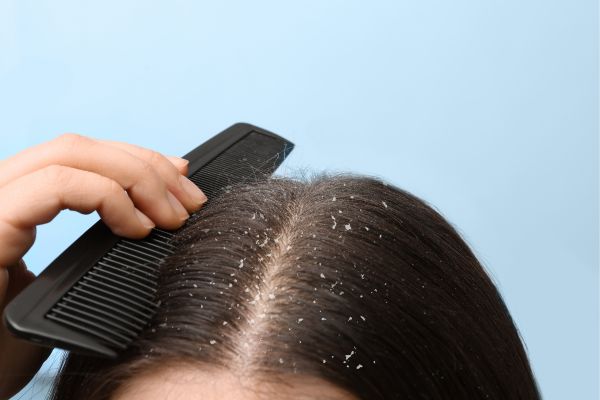
When to consult a healthcare professional?
It is recommended to consult a healthcare professional, such as a dermatologist or trichologist, if you observe any of the following signs:
Dandruff persists despite treatments: If you've tried anti-dandruff shampoos and home remedies, but your dandruff persists or gets worse, it's time to see a professional.
Intense itching: If your itchy scalp is so intense that it keeps you awake or interrupts your day, you should seek professional help.
Redness or inflammation: A red, inflamed or irritated-looking scalp merits professional consultation.
Hair Loss: If you notice excessive hair loss or thinning areas on your scalp, consult a professional. This could indicate a more serious condition like alopecia.
Scalp pain: Pain is never a good sign. If your scalp is painful to the touch, you should consult a professional.


